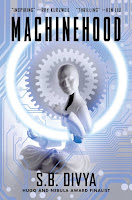Fans of “adult” science fiction should not ignore Chaos On CatNet.
 |
| Chaos on CatNet is the sequel to Naomi Kritzer's award-winning Catfishing on CatNet. |
Set in the very-near future, the CatNet novels centre on a high-school-age girl Steph, who is befriended by a friendly web-based artificial intelligence that goes by the handle Cheshire Cat. The previous works in the series (the Hugo-winning short story “Cat Pictures Please,” and the Lodestar-winning novel Catfishing on CatNet) focused on the good that a highly intelligent AI with access to big data could do, and on battles over control of data. In Chaos on Catnet, Kritzer starts to look at the other side of the same coin.
Picking up within weeks of where Catfishing on CatNet left off, this latest novel introduces a second artificial intelligence — one whose goals and motivations are murkier than a simple appreciation of domestic felines. This major plot-line explores just how creepy and ugly AI-directed behavioural change algorithms can get; both in terms of beguiling people into destructive fantasy-based worldviews, and in terms of turning people against each other. The fact that Kritzer ties these algorithms both to destructive religion and to tribalist Q-Anon style groups is telling, and insightful.
This book is set in the very, very near future. There are self-driving taxi cabs, the General Dynamics quadruped robots are now consumer-ready, but there are no technological advances that are overly fantastical. In many ways, Kritzer is in conversation with several other authors who have been playing in similar sandboxes: people like Karl Schroeder and Cory Doctorow. It is interesting to compare Kritzer’s approach to the future of policing with that of Doctorow’s approach in his novel Attack Surface. Kritzer’s thoughtful, hopeful blueprint for a better system of policing in Minneapolis is a highlight of the book.
One aspect of the novel that helps elevate Chaos On CatNet above the preceding CatNet works is the
 |
| Minneapolis - a city rich with labour history and for many years the heart of the flour industry is a terrific setting for this novel. (Image via PIXY.org) |
use of space and place. Kritzer’s near-future Minneapolis is recognizable to those who have spent time in the city, but also offers a constructive and thoughtful framework for how a city might respond to the riots of last summer. Those riots — which she briefly writes about in a terrific afterword — took place as she was in the process of revising and editing her draft. She decided to “write the Minneapolis you want to see.”
In many ways the present is already catching up to a novel whose first draft was probably written just over a year ago: the chaos caused by the AI antagonist has clear parallels to the ways in which social media algorithms helped fuel the January 6 attack on the U.S. Capitol.
Late in the novel, there are some plot elements that seem to vanish mid-stream (What happened to the big scary robot army? We don’t know!), and the ending is a little too nice and convenient. But despite these quibbles, the novel holds together remarkably well.
Chaos On Catnet should be seriously considered for the Hugo Award for best novel alongside other more “adult” works.
Late in the novel, there are some plot elements that seem to vanish mid-stream (What happened to the big scary robot army? We don’t know!), and the ending is a little too nice and convenient. But despite these quibbles, the novel holds together remarkably well.
Chaos On Catnet should be seriously considered for the Hugo Award for best novel alongside other more “adult” works.




